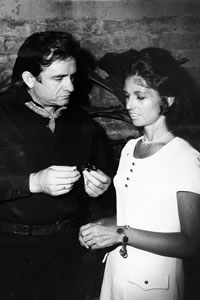Lady and the Flag
When Carole Hickerson’s husband was missing in action during the Vietnam War, she started a movement of families frustrated by a lack of information on their missing loved ones.

By .(JavaScript must be enabled to view this email address)
E-mail this story | Print this page | Archive | RSS |
 Del.icio.us
Del.icio.us
|
international tour trying to put pressure on North Vietnam. The Department of Defense advised them where to go. With pressure from families mounting, the suffer-in-silence policy was quietly repealed in 1970. They met with Pope Paul at the Vatican. They sat with Indira Gandhi. They flew to Laos trying to get to Hanoi, but weren’t allowed in. They went to England and France, Norway and Egypt, Italy and Germany and finally the Soviet Union, where they were apprehended and locked in an airport hotel until they were kicked out of the country.
Such adventure would have discouraged most activists. But these woman were motivated.
“I probably should have been (scared),” Hickerson says with a laugh. “I look back at it now and say, ‘Oh my gosh, what a dummy!’”
A second trip included stops at the Paris Peace Talks and at the North Vietnamese embassy in Laos, where they once again tried to get permission to fly to Hanoi. Once again they were denied and their request to forward mail was refused. Communist officials met with some of the wives, but not Hickerson. She was off limits; her husband had been shot down in Laos.
“You can’t imagine the cloak-and-dagger aspect of the whole thing. When they went in, and I got to sit on the side, the North Vietnamese representative met with the other three wives, and you could hear something going on behind a curtain. Everything was surreal.”
Back in the U.S., Hickerson recruited actors, musicians and politicians. California Gov. Ronald Reagan gave his support, as did Nixon’s staff. Peter Fonda spoke at rallies, Johnny Cash lent a hand and John Wayne wore Steve’s POW/MIA bracelet and sent gifts and letters to Hansen’s 8-year-old son Todd for years, often ending the notes: “Give ‘em hell.”
But Hickerson’s journey wasn’t always pleasant.
Invited to speak to numerous community organizations and at colleges across the land, she found the reception difficult at times.
“I’ve spoken at colleges and had things thrown at me by the students and was booed, ‘Your husband got what he deserved,‘that sort of thing. All of us did the things that we did just because we cared so much. It was just something I had to do at the time.”

|
Hickerson’s efforts put pressure on both the U.S. and North Vietnam. Living conditions for the captives improved. She still knew almost nothing about her husband’s fate, but her support never wavered.
“I wrote to Steve every night. The letters I sent off would come back and packages that we sent through leftist organizations were returned after they had taken out the stuff they wanted. I guess I was just stubborn.”
That feeling changed in 1973 at a White House reception for POWs. There she met Sgt. Frank Cius, a crewmember aboard her husband’s helicopter. Cius told her Steve was injured in the crash, that he was involved in a firefight with enemy soldiers and that he doubted her husband could have survived.
“He was the first one who had given me definitive information that Steven had not made it,” she says.
Even with some closure, the next several months were tough. Almost nightly on TV she saw POWs returning to their families. Each time she cried, hoping to see Steve walk off the plane. Slowly she worked her way through the pain with the help of family and friends. A few months later, what she likes to call the second chapter of her life began at a POW event in the Cotton Bowl.
Ross Perot and some other Dallas businessmen put on a welcome home party that featured, among many others, Bob Hope and Tony Orlando and Dawn, whose hit Tie a Yellow Ribbon had become a symbol for the movement. Carole was invited. Sitting next to her was former POW Jim Hickerson.
“This was an emotional time for me,” Carole recalls. “I was coming to the realization that Steve wasn’t coming home, and Jim is realizing that what he thought was in fact was no more. (Hickerson’s wife had remarried while he was a POW). Tears are running down my cheeks and Jim, who is a very soft-hearted soul, leaned over and just gave me a little kiss on my cheek.”
From that simple gesture of support a friendship slowly evolved.
“He asked if he could call me and it was just to com-
Page 2 of 3 pages for this story < 1 2 3 >
E-mail this story | Print this page | Comments (0) | Archive | RSS
Most Recent Comment(s):








